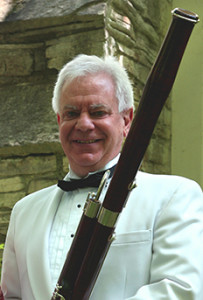 After I finish writing this column, I am heading over to St. Luke’s Episcopal Church in Sister Bay to hear some of the rehearsal of a world premiere. I stop in at a few rehearsals now and then, but don’t make a regular practice of attending them. But tonight is the first rehearsal of a piece written just for us by our Composer in Residence, Jacob Beranek. I can’t wait to hear it. It is particularly exciting to be able to be among those hearing a piece the very first time it is played.
After I finish writing this column, I am heading over to St. Luke’s Episcopal Church in Sister Bay to hear some of the rehearsal of a world premiere. I stop in at a few rehearsals now and then, but don’t make a regular practice of attending them. But tonight is the first rehearsal of a piece written just for us by our Composer in Residence, Jacob Beranek. I can’t wait to hear it. It is particularly exciting to be able to be among those hearing a piece the very first time it is played.
Of course it won’t be an absolutely polished reading since the work is entirely new to everyone in the group, but at last I will get to hear some of what I could just imagine by looking at the score. I can only guess how excited Jacob will be although he has heard the middle movement played in a different version. He was invited to attend the prestigious Talis Music Festival and Academy in Switzerland that took place a few weeks ago. He was one of only four young composers invited to be a Fellow in Composition out of 60 initially considered. He asked if we would consent to his making an adaptation of the second movement for winds and bass that could be performed while he was there. Since Jacob’s piece was commissioned for Midsummer’s Music by the MMG Foundation, we have exclusive rights to its performance for a period of time, but we thought that having a part of it performed in such a prestigious situation was an honor and great for Jacob.
As I have been looking over all the music that we will be performing in this period leading up to Labor Day, it has occurred to me that there is something a bit different for us. It turns out that four of the works are by American composers and all were written within the last 100 years. What is particularly surprising is that two of those works are among the most beloved pieces of all time. Samuel Barber’s Adagio for Strings hardly leaves a dry eye in the house. It is one of the most recognizable and emotion-laden works ever written. Barber originally wrote the work as the slow movement of a string quartet, but he recognized that this movement stood out because of its expressivity. He made an arrangement for full string orchestra and had his partner, the composer Gian Carlo Menotti, deliver it to Toscanini who seemed to take virtually no notice of it. Barber was disappointed and perturbed. But two years later, it showed up on an NBC Symphony performance broadcast on the radio and immediately became a sensation.
It has been used in many films including Platoon and Elephant Man and was played at the funerals of FDR and Albert Einstein. Barber made a later arrangement of it for chorus to the words of the Agnus Dei (Lamb of God).
The other popular work on the same program is a surprise. We have decided to alter our program and replace Paul Schoenfield’s Three Rhapsodies with his beloved Café Music, a work that we receive more requests for than any other. It turns out that the Rhapsodies are longer than I had realized and require substantially more rehearsal time than I had imagined. When David Perry, who played the world premiere of the Rhapsodies, suggested Café Music as an alternative, it suddenly made great sense. Café Music is as infectiously upbeat as Barber’s Adagio is soulful and heart rending.
In between the two, we are going to do another Barber masterpiece, his Dover Beach for voice and string quartet, based on Mathew Arnold’s poem by the same name. This will feature the amazing mezzo-soprano, Susan Platts. We are so fortunate to be able to bring this international star, previously heard at La Scala and Covent Garden, to Door County. She has the perfect buttery voice for this heartfelt warning of the dangers of war written during that tense and volatile time between the two World Wars. We will conclude the program with Schubert’s ever popular “Trout” Quintet for piano and strings, and Susan will preface that work with her rendition of Schubert’s song, Die Forelle (The Trout), since this is the melody that Schubert used for the theme and variation movement in the Quintet and the reason the Quintet gets its name.
If all that isn’t enough to tickle your fancy, you can make sure you hear it at our Labor Day Benefit at Bjorklunden at 3:00. We will be rolling up the rug with great music, a silent auction, a wine pull featuring wines with musical names, and delicious food and drink afterwards. A special way to toast a great summer and a great season! Call 920-854-7088 or visit www.midsummersmusic.com for tickets, reservations, or more information.
